Step 1 – Register at https://www.datadoghq.com/
Step 2 – Select the UBUNTU from the Datadog supported agent list
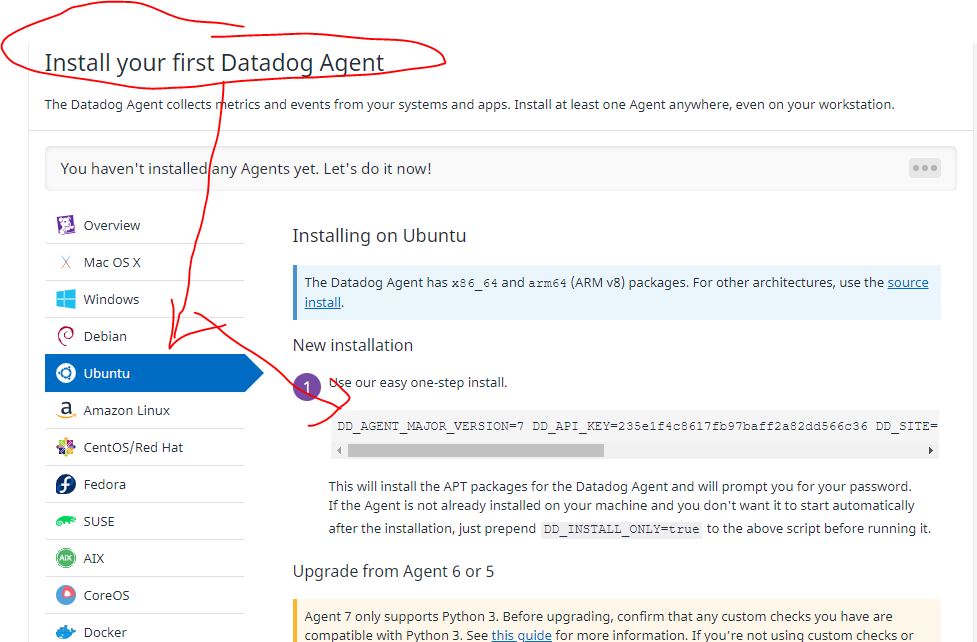
Step 3 – Run following commands
# DO NOT RUN THIS COMMANDS. Its an Example. COPY FROM Datadog.
$ D_AGENT_MAJOR_VERSION=7 DD_API_KEY=235e1f4c8617fb97badsadaddc36 DD_SITE="datadoghq.com" bash -c "$(curl -L https://s3.amazonaws.com/dd-agent/scripts/install_script.sh)"
# Run Following commands for Working with Datadog Agents
$ systemctl start datadog-agent
$ systemctl stop datadog-agent
$ systemctl restart datadog-agent
$ systemctl status datadog-agent
$ ls /var/log/datadog/
$ more /etc/datadog-agent/datadog.yaml
$ more /var/log/datadog/agent.log
$ more /var/log/datadog/process-agent.log
$ more /var/log/datadog/trace-agent.log
$ datadog-agent configcheck
$ datadog-agent config
$ datadog-agent health
$ datadog-agent hostname
$ datadog-agent version
$ datadog-agent status [ very important ]
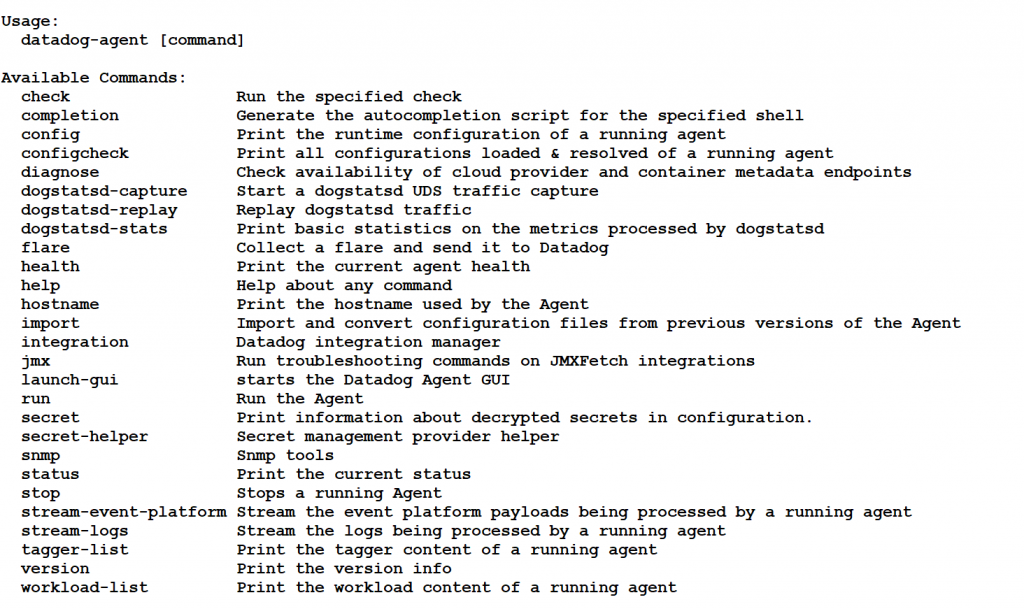
root@ip-172-31-45-47:/home/ubuntu# datadog-agent
The Datadog Agent faithfully collects events and metrics and brings them
to Datadog on your behalf so that you can do something useful with your
monitoring and performance data.
Usage:
datadog-agent [command]
Available Commands:
check Run the specified check
completion Generate the autocompletion script for the specified shell
config Print the runtime configuration of a running agent
configcheck Print all configurations loaded & resolved of a running agent
diagnose Check availability of cloud provider and container metadata endpoints
dogstatsd-capture Start a dogstatsd UDS traffic capture
dogstatsd-replay Replay dogstatsd traffic
dogstatsd-stats Print basic statistics on the metrics processed by dogstatsd
flare Collect a flare and send it to Datadog
health Print the current agent health
help Help about any command
hostname Print the hostname used by the Agent
import Import and convert configuration files from previous versions of the Agent
integration Datadog integration manager
jmx Run troubleshooting commands on JMXFetch integrations
launch-gui starts the Datadog Agent GUI
run Run the Agent
secret Print information about decrypted secrets in configuration.
secret-helper Secret management provider helper
snmp Snmp tools
status Print the current status
stop Stops a running Agent
stream-event-platform Stream the event platform payloads being processed by a running agent
stream-logs Stream the logs being processed by a running agent
tagger-list Print the tagger content of a running agent
version Print the version info
workload-list Print the workload content of a running agent
Flags:
-c, --cfgpath string path to directory containing datadog.yaml
-h, --help help for datadog-agent
-n, --no-color disable color output
--sysprobecfgpath string path to directory containing system-probe.yaml
Use "datadog-agent [command] --help" for more information about a command.
You would get output at the end of Installation
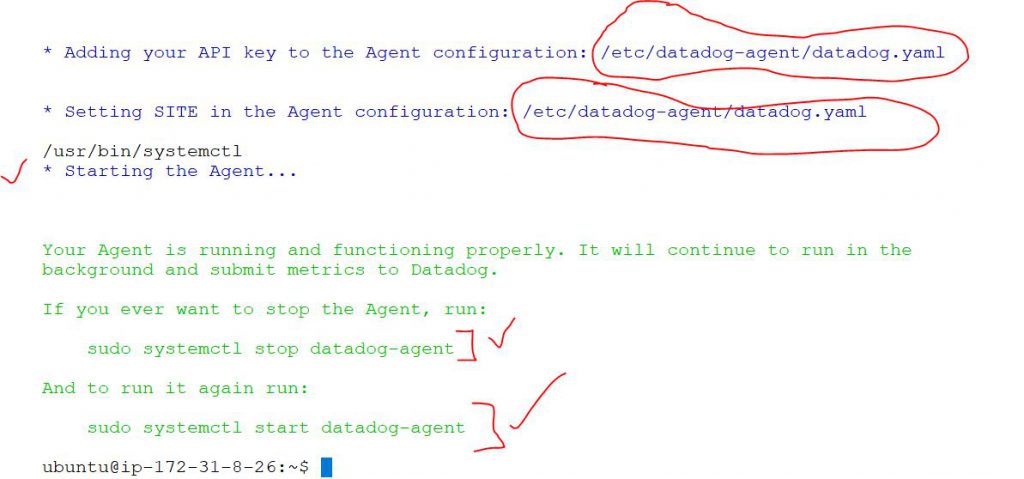
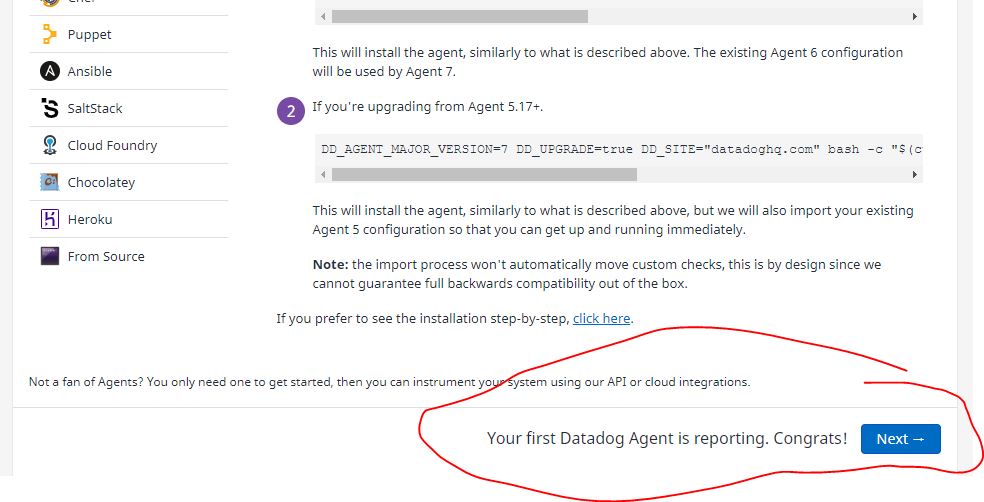
How to verify Whether Agent is sending a data to Datadog cloud?
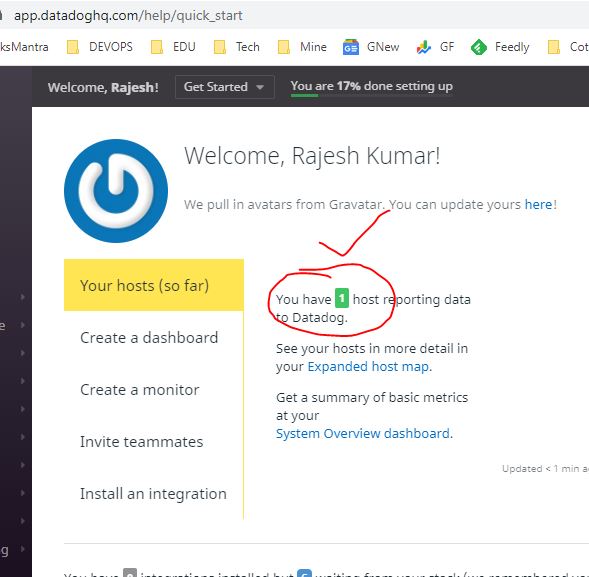

I’m a DevOps/SRE/DevSecOps/Cloud Expert passionate about sharing knowledge and experiences. I am working at Cotocus. I blog tech insights at DevOps School, travel stories at Holiday Landmark, stock market tips at Stocks Mantra, health and fitness guidance at My Medic Plus, product reviews at I reviewed , and SEO strategies at Wizbrand.
Please find my social handles as below;
Rajesh Kumar Personal Website
Rajesh Kumar at YOUTUBE
Rajesh Kumar at INSTAGRAM
Rajesh Kumar at X
Rajesh Kumar at FACEBOOK
Rajesh Kumar at LINKEDIN
Rajesh Kumar at PINTEREST
Rajesh Kumar at QUORA
Rajesh Kumar at WIZBRAND

 Starting: 1st of Every Month
Starting: 1st of Every Month  +91 8409492687
+91 8409492687  Contact@DevOpsSchool.com
Contact@DevOpsSchool.com
